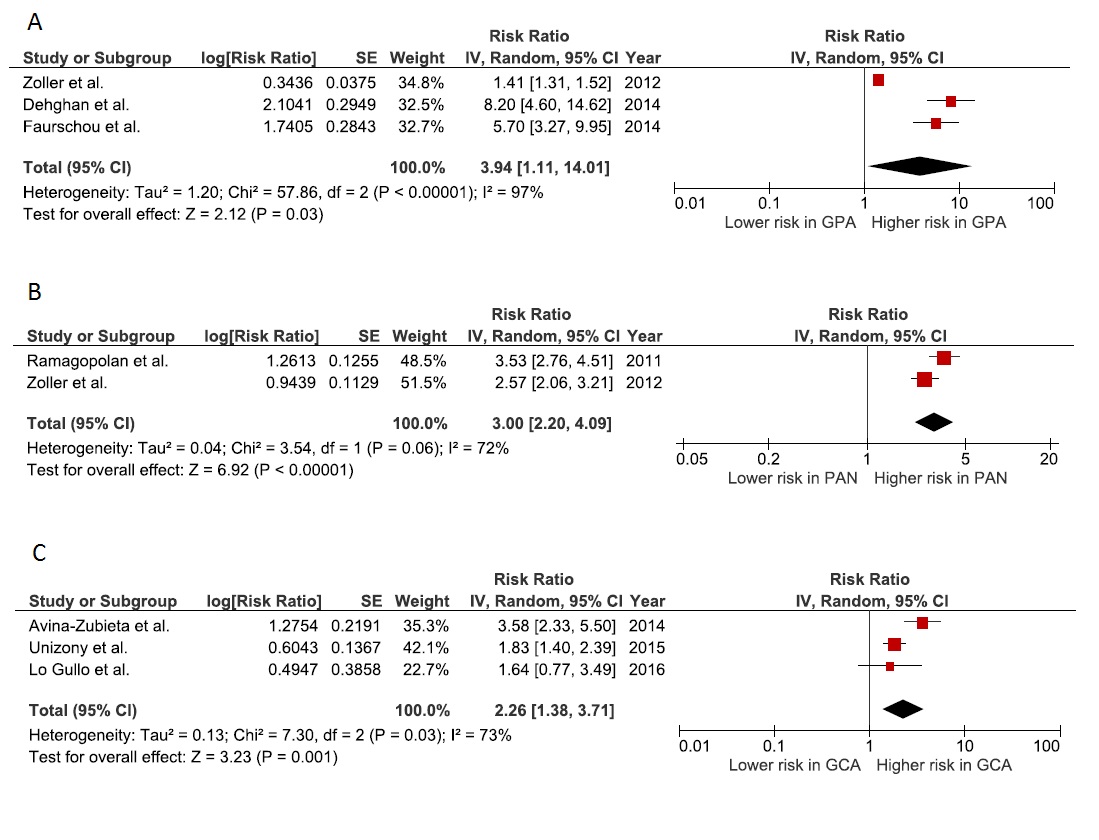Session Information
Session Type: ACR Poster Session C
Session Time: 9:00AM-11:00AM
Risk of Venous Thromboembolism in Patients with Systemic Vasculitides: A Systematic Review and Meta-analysis
Background/Purpose: Venous thromboembolism (VTE) is a common medical problem with a significant morbidity and mortality. Chronic inflammatory state has been increasingly recognized as an important risk factor for VTE. Several immune-mediated inflammatory disorders, such as systemic lupus erythematosus and rheumatoid arthritis, are associated with increased incidence of VTE in epidemiologic studies. Systemic vasculitides are group of immune-mediated inflammatory disorders characterized by inflammation in blood vessels. Apart from Behcet’s disease, it is unclear if these disorders are also associated with increased risk of VTE due to limited data. To further investigate this possible association, we conducted a systematic review and meta-analysis of observational studies that compared the risk of VTE in patients with systemic vasculitides versus participants without systemic vasculitides.
Methods: Two investigators independently searched published studies indexed in MEDLINE, EMBASE and the Cochrane database from inception to March 2015 using the terms for each type of vasculitis in conjunction with the terms for venous thromboembolism. A manual search of references of retrieved articles was also performed. The inclusion criteria were as follows: (1) observational studies evaluating the association between vasculitis and VTE and (2) odds ratios, relative risk (RR) or hazard ratio or standardized incidence ratio with 95% confidence intervals (CI) were provided. Study eligibility was independently determined by the two investigators noted above. Newcastle-Ottawa scale was used to assess the quality of included studies. RevMan 5.3 software was used for the data analysis. Point estimates and standard errors were extracted from individual studies and were combined by the generic inverse variance method of DerSimonian and Laird. Given the high likelihood of between study variance, we used a random-effect model rather than a fixed-effect model. Statistical heterogeneity was assessed using the Cochran’s Q test.
Results: Seven studies investigating the risk of VTE among patients with granulomatosis with polyangiitis (GPA), polyarteritis nodosa (PAN) and giant cell arteritis (GCA) were identified. Elevated risk were seen in all three vasculitides (GPA, pooled RR 3.94, 95% CI 1.11 – 14.01; PAN, pooled RR 3.00, 95% CI 2.20 – 4.09; GCA, pooled RR 2.26, 95% CI 1.38 – 3.71). Forest plots are demonstrated in figure 1A-1C, respectively.
Conclusion: Our study demonstrated a statistically significant increased VTE risk among patients with GPA, PAN and GCA.
To cite this abstract in AMA style:
Ungprasert P, Koster MJ, Warrington KJ. Risk of Venous Thromboembolism in Patients with Systemic Vasculitides: A Systematic Review and Meta-Analysis [abstract]. Arthritis Rheumatol. 2016; 68 (suppl 10). https://acrabstracts.org/abstract/risk-of-venous-thromboembolism-in-patients-with-systemic-vasculitides-a-systematic-review-and-meta-analysis/. Accessed .« Back to 2016 ACR/ARHP Annual Meeting
ACR Meeting Abstracts - https://acrabstracts.org/abstract/risk-of-venous-thromboembolism-in-patients-with-systemic-vasculitides-a-systematic-review-and-meta-analysis/

